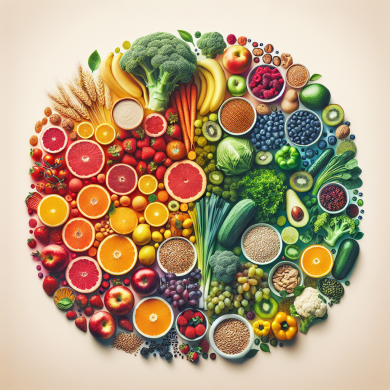Enhance Digestion with Clean Eating Habits
Introduction
The importance of a healthy digestive system cannot be overstated. It plays a critical role in breaking down food, absorbing nutrients, and eliminating waste from the body. However, modern dietary habits, often laden with processed foods, can disrupt digestion, leading to discomfort and health issues. Clean eating, a concept that emphasizes whole, natural foods, offers a pathway to improving digestive health. This article will explore how clean eating habits can enhance digestion, providing practical tips and insights to optimize your digestive well-being.
Understanding Digestion
Before delving into clean eating, it is crucial to understand the basics of digestion. The digestive process begins in the mouth, where enzymes in saliva start breaking down food. It continues in the stomach, where gastric acids further break down food into a semi-liquid form known as chyme. The small intestine is where most nutrient absorption occurs, while the large intestine absorbs water and forms waste for elimination. A balanced digestive system efficiently handles these processes, but poor dietary choices can lead to bloating, constipation, and other digestive issues.
What is Clean Eating?
Clean eating is a dietary approach that focuses on consuming whole, minimally processed foods in their most natural state. It encourages the intake of fruits, vegetables, lean proteins, whole grains, and healthy fats, while avoiding artificial additives, refined sugars, and processed foods. Clean eating is not a restrictive diet but a lifestyle choice that promotes balance and simplicity, aligning with the body’s natural needs.
The Impact of Clean Eating on Digestion
Fiber-Rich Foods Enhance Gut Health
Fiber is a cornerstone of clean eating, playing a significant role in promoting digestive health. Soluble fiber, found in foods like oats, beans, and apples, absorbs water and helps form a gel-like substance that slows digestion, aiding in nutrient absorption. Insoluble fiber, found in whole grains, nuts, and vegetables, adds bulk to stool and aids in its passage through the digestive tract. A diet rich in fiber supports regular bowel movements, reduces the risk of constipation, and fosters a healthy gut microbiome.
Reducing Inflammatory Foods
Processed foods often contain additives, preservatives, and unhealthy fats that can cause inflammation in the digestive tract. Clean eating minimizes these inflammatory foods, reducing the risk of digestive disorders such as irritable bowel syndrome (IBS) and inflammatory bowel disease (IBD). By focusing on anti-inflammatory foods like leafy greens, fatty fish, and olive oil, clean eating helps soothe the digestive system and promote healing.
Promoting Healthy Gut Flora
The gut microbiome, a collection of trillions of microorganisms living in the digestive tract, plays a vital role in digestion, immunity, and overall health. Clean eating supports a healthy gut flora by providing probiotics and prebiotics. Probiotics, found in yogurt, kefir, and fermented foods, introduce beneficial bacteria into the gut. Prebiotics, found in foods like garlic, onions, and bananas, provide nourishment for these bacteria. A balanced gut microbiome enhances digestion and protects against pathogenic bacteria.
Practical Tips for Clean Eating
Choose Whole Foods
Opt for whole, unprocessed foods whenever possible. Fresh fruits and vegetables, whole grains, lean proteins, and healthy fats should form the basis of your diet. These foods are rich in essential nutrients and free from harmful additives.
Read Labels Carefully
When purchasing packaged foods, take the time to read labels. Look for products with short ingredient lists and avoid those with artificial additives, preservatives, and high levels of sugar or sodium. Being informed helps you make healthier choices that support digestion.
Plan Your Meals
Meal planning is an effective way to ensure you adhere to clean eating habits. Prepare meals at home using fresh ingredients, and avoid the temptation of processed convenience foods. Planning ahead saves time and promotes mindful eating.
Stay Hydrated
Water plays a crucial role in digestion, helping to break down food and absorb nutrients. Aim to drink at least eight glasses of water a day, and consider herbal teas or infused water for variety. Staying hydrated prevents constipation and supports overall digestive health.
Mindful Eating Practices
Eating mindfully involves paying attention to the sensory experience of eating, such as taste, texture, and aroma. It encourages slower eating, which allows the body to signal fullness and improves digestion. Chewing food thoroughly can also aid in the digestive process.
Overcoming Challenges in Clean Eating
Adopting clean eating habits can be challenging due to time constraints, social situations, and cravings for processed foods. However, with determination and planning, these challenges can be overcome. Start by making gradual changes to your diet, such as incorporating more fruits and vegetables or replacing refined grains with whole grains. Seek support from family and friends, and focus on the positive impact clean eating has on your digestion and overall health.
Conclusion
Enhancing digestion through clean eating is a sustainable approach to achieving better health and well-being. By focusing on whole, natural foods and avoiding processed, inflammatory foods, you can support your digestive system and promote a healthy gut microbiome. With practical tips and mindful eating practices, clean eating becomes a rewarding lifestyle choice that benefits not only digestion but also overall health. Embrace clean eating and experience the transformative effects it can have on your digestive health.














Add comment